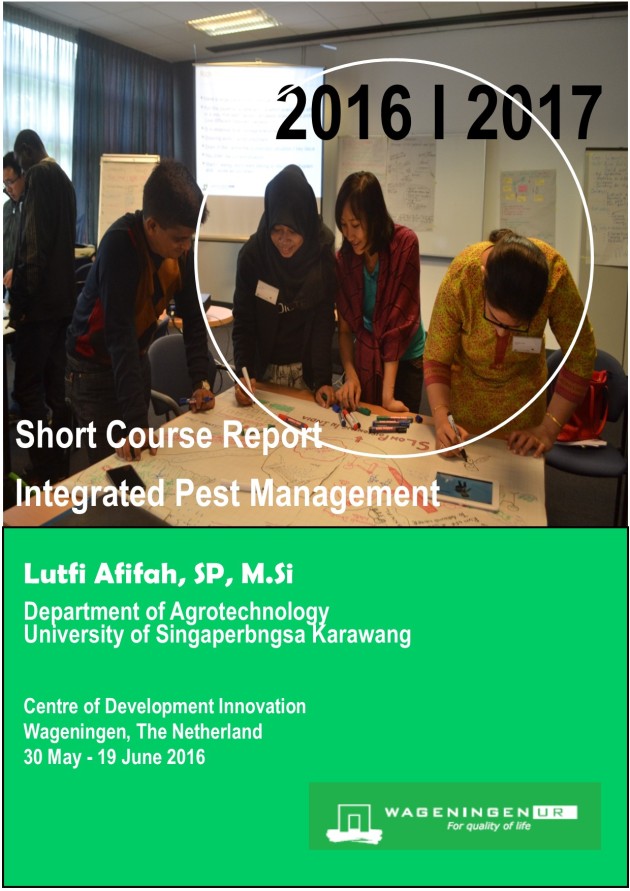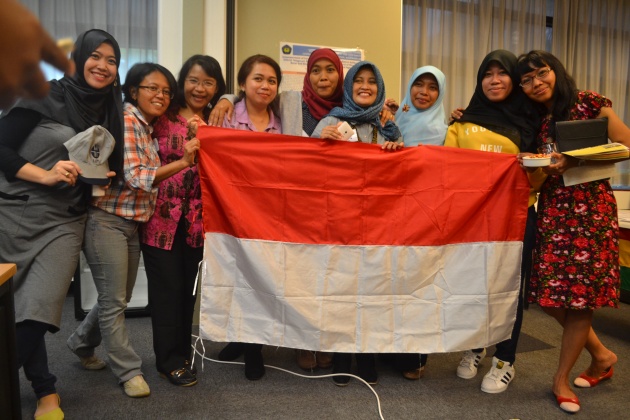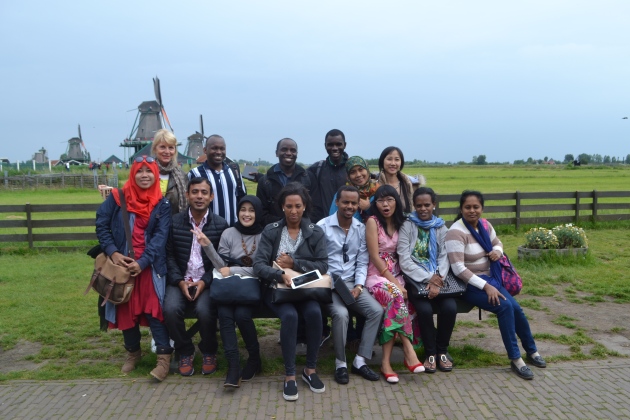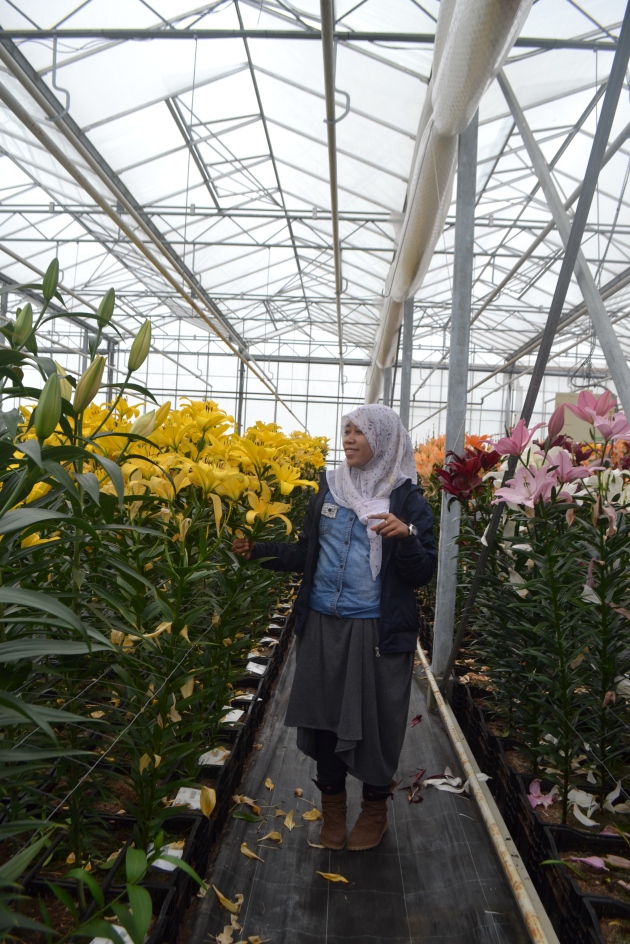Short Course Report Integrated Pest Management, CDI Wageningen
*Download Short Course IPM File

I. Time schedule and venue
The daily programme was take place in Het hov wageningen and University of Wageningen ‘Forum Building’:
– morning: from 08:30 to 12:30 hrs with one coffee/ tea break
– afternoon: from 13:30 to 17:30 hrs with one coffee/ tea break
II Background information for the course Integrated Pest management and food safety
GENERAL FOCUS OF THE TRAINING PROGRAMME
Globally crops suffer losses caused by various pests having a negative impact on food security of farmers, communities and particularly fast expanding urban areas. In addition to food security there is an increased demand for food safety and food of better quality by the growing populations and international trade. The widespread dependence on chemical pesticides results in high economic and environmental costs. Increased environmental and public health awareness and the need to implement sustainable agricultural production systems tend to discourage the injudicious use of pesticides. IPM aims to minimise the use of chemical pesticides and to ensure an integration of various control measures in an informed manner without harmful effects on the environment and occupational and public health.
Researchers working with a wide range of crops around the world have proved the technical feasibility of IPM and significant successes have been achieved with specific pest problems. Generally IPM programmes combine several tactics into a multiple pest management strategy. Because of its complexity, however, IPM proved to be more difficult to apply on farms than simple chemical control techniques. IPM demands an understanding not only of the technical aspects of pest management, but also of all the possible effects of the various control measures on the farmer, the family’s household and livelihood. Participatory approaches to research, extension and development of IPM have proven to contribute to the success of IPM implementation at farmers’ level. A level playing field to support IPM is required through a conducive policy and institutional environment.
METHODOLOGY OF TRAINING PROGRAMME
The training is job-oriented and experience-based, therefore it is highly interactive: it provides participants with the opportunity to learn from a wealth of international experience available among themselves and the course facilitators. The topics will be addressed through lectures, exercises, field visits, case studies and personal and/or group assignments.
Excursions and field work enable comparison of own experiences with practices in the Netherlands, whereas group assignments facilitate exchange of knowledge and experiences between participants. The training programme Integrated Pest Management and food safety is composed of two components, being (i) Pesticides and food safety in IPM, and (ii) IPM policy and institutional innovations.
Pesticides and food safety in IPM
FOCUS OF THE COURSE PROGRAMME
Over the last decades, consumers have shown a growing concern about the safety and quality of their food, particularly those living in the North, where the main share of the consumption takes place. The public and private sectors in the North have quickly responded to this concern. Both government regulators (national and international) and private food retailing companies developed grades and standards for the production of food in order to meet requirements for food safety and quality. All horticultural producers must meet these criteria of safety and quality, if they want to sell their products in the international (northern) markets. These grades and standards lean heavily on IPM and Integrated Crop Management (ICM) and thus support in a way the development and implementation of sustainable agriculture practices. These grades and standards seem to create two interrelated problems. The quick response of various public and private sectors has led to a wide range of different standards, grades and certification schemes that hardly anyone can oversee. Finding the way in this standard jungle is both time consuming and cost increasing for all producers. However, this effect burdens most heavily on producers from developing countries, especially the small-scale producers. It becomes more and more difficult for them to gain or maintain international market access, as they need to meet the various food safety requirements at considerable costs and effort. In many countries in the South export horticulture is growing rapidly, but these grades and standards increasingly present a threat to export and thus to (small-scale) producers.
TRAINING OBJECTIVES
Long term:
- To contribute to rural development in the South through the improved capacity of organizations and institutions to apply IPM and integrate food safety and quality grades and standards into sustainable agricultural / horticultural systems; and
- To support market access to (international) markets of small-scale producers, particularly of fresh fruits and vegetables.
Specific objectives:
Participants of this course update and strengthen their knowledge, insight and skills on:
- Food chains and the role of primary production in achieving food safety;
- Public and private food safety and quality grades and standards in the food chain and the roles of the different stakeholders; and
- Implications for implementation of IPM, Integrated Crop Management / Good Agricultural Practices for small-scale producers.
IPM policy and institutional innovations
FOCUS OF THE COURSE PROGRAMME
Appropriate implementation of Good Agricultural Practices and IPM for food safety and international market access requires a conducive environment of supportive and enabling policies and institutions. This can be achieved through multi-stakeholder processes (MSP) with the aim to enable IPM and/or pesticide-related policies and supportive institutional innovations.
TRAINING OBJECTIVES
Long term:
- To contribute to rural development in the South through the improved capacity of organizations and institutions to apply IPM and integrate food safety and quality grades and standards into sustainable agricultural / horticultural syste
- To support development of IPM policies and institutional innovation
Specific objectives:
Participants of this course will update and strengthen their knowledge, insight and skills on:
- The roles of stakeholders in IPM policy development and institutional innovations through the use of multi-stakeholder processes (MSP):
- The roles of stakeholders in supporting the implementation of IPM and sustainable agriculture through the use of MSP;
- Levels of participation relevant for IPM policies and institutional innovations;
- Options for supportive IPM policies and institutional requirements; and the formulation of recommendations for improving the effectiveness and impact of IPM policies, instruments, institutions and implementation practices in the respective countries and in the own working situation
III Course programme from day to day
Integrated pest management and food safety
30 May – 17 June 2016
Course Coordinator: Irene Koomen
Location: Dorskampzaal 1 & 2
SUNDAY 29 MAY
Support Staff Registration and photos participants
I arrived in the Schipol Airport, Amsterdam, the Netherland. I went to the Giethorn before went to the Wageningen. It tooks about 2 hours from the airport to the Uni Wageningen Campus. I went to the campus by train ‘Metro’ from Airport to the Wageningen and went to the campus by bus ‘88’ from Wageningen to the Campus. I registerd as the guest of CDI and stayed at Het hov Wageningen Hotel.

Welcome to the Netherland, Giethorn
| MONDAY 30 MAY | ||
| 9:00 | Bruggeman | Welcome to Wageningen UR Centre for Development Innovation |
| 9:30 | Koomen | Course objectives and programme, Course expectations |
| 11.00 | Koomen | Participants get to know each other |
| 13:30 | Koomen | IPM, its nature & characteristics |
| 16:30 | All | Network drink |

Lectures by Course Coordinator Irene Koomen from CDI Wageningen
In the first day of International course, the course leader of Integrated Pest Management give us explanation about the course. We got the first lecture in Wageningen about IPM, its nature & characteristics.
| TUESDAY 31 MAY | ||
| 8:45 | All | Reflection |
| 9:15 | Koomen Koomen All | Food safety & Risk assessment |
| 13:30 | All | Introduction to poster session |
| 14:00 | Athmer | Preparation of posters (pre-course assignment) |
| 15:30 | Poster session | |
| 19:30 | Meet the Netherlands |
Poster session about Integrated Pest Management in Karawang, Indonesia
In the second day of the course we got the reflection in early morning. The reflection take place in the Het hov Wageningen. The reflection allowed us to remember all of the things we learnt yesterday session. It will help us to remind the courses lectures. The reflection was held everyday in the morning before the lectures start.
| WEDNESDAY 1 JUNE | ||
| 8:45 | All | Reflection |
| 9:15 | Koomen | Introduction individual action plan |
| 10:00 | All | Group assignment |
| 13:00 | Departure | Wageningen Campus |
| 13:30 | De Kogel | IPM research at Biointeractions & Plant Health |
In the third day, the course leader gave us the individual action plan. The individual action plan was needed to know the participant work in the arena of integrated pest management and food safety. It was a good media for me to share my social activity about “Empowerment of Farmer Groups “Benong II”, Karawang, Indonesia: Pest Control of Rice Stem Borer and Brown Plant Hopper Using Biological Agents”. The individual action plan will be provided in this activity report.


Group assignment theme: Case Study of IPM in India “Slow Poisoning in India”
| THURSDAY 2 JUNE | ||
| 8:45 | Rizopulus | Reflection |
| 9:15 | Group work | Stakeholder analysis |
| 13:00 | All | Departure |
| 13:30 | Helsen | Visit to PPO-Fruit, Randwijk |
| 17:00 | Return to Wageningen | |


| THURSDAY 2 JUNE | ||
| 8:45 | Rizopulus | Reflection |
| 9:15 | Group work | Stakeholder analysis |
| 13:00 | All | Departure |
| 13:30 | Helsen | Visit to PPO-Fruit, Randwijk |
| 17:00 | Returnto Wageningen | |
In the forth day, as usual we got the reflection in the morning and also we got the Stakeholder analysis by Matilda. We got the analysis that the IPM case need more stakeholder. We can not work with ourself but we need Multistakeholder to solve the problems.


Multistakeholder analysis: Case Study Pesticide Contamination in Water
Visit to PPO-Fruit, Randwijk
| FRIDAY 3 JUNE | ||
| 8:45 | Reflection | |
| 9:15 | Bouma | Role of pesticides in IPM |
| 13:30 | Van der Maden | Occupational health risk of pesticides – a case study from Indonesia |
| 14:30 | Koomen / Van der Maden | Group work cont. |
In the fifth day, we got a lectures from Bouma, Ministry staff of Agriculture Department. Also we got the lecture about Occupational health risk of pesticides – a case study from Indonesia. It was incrideble that we had a terrible problem with occupational health especially for farmers.
 Occupational health risk of pesticides: safety outfit for spraying pesticide
Occupational health risk of pesticides: safety outfit for spraying pesticide
SATURDAY 4 JUNE & SUNDAY 5 JUNE
Free time
| MONDAY 6 JUNE | ||
| 8:45 | All | Reflection |
| 9:15 | Stoetzer | Role of extension in IPM |
| 10:45 | Vos | Plant clinics |
| 13:30 | Edens | IPM policy in the Netherlands |
| 15:00 | Bianchi | Biological control in IPM |
In the sixth day we got the lectures about plant clinics. Plant clinics was provided by the government or private company to diagnose all the problems which is faced by the farmers. We also got the lectures about IPM policy in the Netherland also using of the Biological control in IPM. Biological control is a good method to control plant pest and disease.
| TUESDAY 7 JUNE | ||
| 8:45 | All | Reflection |
| 9:15 | De Rijk | Introduction to Rikilt – Food Safety Research Institute |
| 9:45 | Noordam | Monitoring MRLs |
| 11:00 | De Rijk | Mycotoxins |
| 13:30 | Rizopolus | Multi-stakeholder processes |
| 19:30 | All | Organisational Market & Networking |
In the seventh day also we got the lectures about MRLs. MRLs is a minimum residue level which can be exsist in the agricultural product. Also we got the lectures about mycotoxins in the agricultural products. Multi-stakeholder analysis also important in all area especially in Agriculture sector. Then in the night we followed organizational market and networking. This program allowed us to introduce the job we had and also introduce the University of Singaperbangsa Karawang.

Organisational Market & Networking: Participant from Indonesia consist of lecturer and reasercher
| WEDNESDAY 8 JUNE | ||
| 8:45 | All | Reflection |
| 9:15 | Stoetzer | Good Agricultural Practices |
| 13:30 | All | Group assignment on IPM Strategy |
In the eight day we had the lectures as usual. We got two lectures, that are Good Agricultural Practices and we had group assignment on IPM Strategy. The Integrated Pest Management strategy allow us to be more critically thinking how to solve the pest and disease problems.

| THURSDAY 9 JUNE | ||
| Excursion | ||
| 8:00 | All | Departure |
| 9:30 | Farm visit, Flevopolder | |
| 12:15 | Lunch Warmonderhof | |
| 13:15 | Warmonderhof | |
| 17:45 | Back in Wageningen | |
In the ninth day, we went to the Warmonderhof to know the Biodynamic Agriculture. We learnt how that system made so sustainable. The system was made by the farmers who provide the product from the farm to fork. The Biodynamic Agriculture is integrated system that provide health product. The farm mainly use less pesticide, they use their own manure. They produce input like manure from its farm.



Farm visit, Flavoland
| FRIDAY 10 JUNE | ||
| 8:45 | All | Reflection |
| 9:15 | Koomen | Finalising group work & presentations |
| 13:45 | Koomen | Interview techniques |
| 15:00 | Introduction & preparation fieldwork | |
In the tenth day we discussed about yesterday session in Flavoland. We learnt all about Biodynamic Agriculture. Then in the afternoon session we got the lectures about interview techniques. The lectures allowed us to know how to make a good questions for interviewer. The interview techniques made us easier to preparing the excursion to the rural area next week.
| SATURDAY 11 JUNE | ||
| 08.00 – 19.00 | Athmer | Social excursion Zaanse Schans & Amsterdam |
In the eleventh day, we went to the Amsterdam. We went to the Zaanse Schans to see the traditional windmills. In Zaanse Schans we also see the klopen shoes made. The klopen shoes is a traditional shoes from fresh wood. We also see how the cheese was made. We tasted many kind of cheese, original cheese, pepper cheese, goat ceas etc.







Social excursion Zaanse Schans & Amsterdam
| SUNDAY 12 JUNE | ||
| 11:00 | Participants | Check-out Hotel Hof van Wageningen |
| 14:00 | Field work | |
| 15:00 | Tour through area on rural development | |
| Evening | Participants | Further preparation of interviews and visits |
In the 12th day we check-out hotel Hof van Wageningen and move to the hotel in Enkhauzen. We went to the Noord Holland. After we arrived in Enkhauzen, Noord Holland then we walked along the Enkhauzen. We walked to the harbor and see how rural area there.

City tour to the rural area, Enkhauzen, Noord Holland.
Monday 13 June
| 09:00 | Royal VEZET
Mrs Els Cornelissen, Quality and Food Safety Manager www.vezet.nl |
Debbemeer 2
1749 DK Warmenhuizen Phone: 0226-396070 Mob.: 06-22206214 E-mail: els.cornelissen@vezet.nl |
| 11:30 | Greenhouse farm Barendse-DC Mrs Petra Barendse www.BezoekAgriport.nl | Agriport 611
1775 TK Middenmeer Mob.: 06-20475768 Email: info@bezoekagriport.nl |
| 13:30 | Bejo Zaden B.V.
Mrs Antoinette de Geus www.bejo.nl |
Trambaan 2
1749 CZ Warmenhuizen Phone: 0226-396 162 Email : A.deGeus@bejo.nl |
| Evening | Analysis Fieldwork |
In the 13th We went to the tomato and sweet pepper greenhouse. The sweet pepper greenhouse was the largest greenhouse in the world. Also we went to the seed company.



Visit sweet pepper greenhouse in Noord Holland, the Netherland
Tuesday 14 June
| 09:00 | Clusius College Hoorn
Piet Vlaming, accountmanager Agro & Groen http://www.clusius.nl/home.aspx |
Blauwe Berg 3
1625 NT Hoorn Phone: 0229-25 94 94 Mob.: 06-55171047 Email: p.vlaming@clusius.nl |
| 11:00 | Gitzels, Young Plant grower, e.g. cabbage and breeding services
Mr Wiliam Gitzels, Director http://www.gitzels.nl/ |
Kerkeland 4
1693 NP Wervershoof Phone: 0228 – 587300 (Cabbage plants),0228 – 587302 (Breeding Services) Email: william@gitzels.nl |
| 13:30 | Rabobank West-Friesland, Agriculture Mrs M. (Mirjam) I. Bus-Geerlofs www.rabobank.nl/wf | Graanmarkt 1
1681 PA Zwaagdijk-Oost Phone: (0228) 566 300 E-mail: Mirjam.bus@rabobank.nl |
| Evening | Analysis Fieldwork |
In the 14th day, we went to the Clusius Collage, Giyzel grower, also Rabobank. In the Clusius Collage we learn about the school of Biodynamic agriculture. This collage also gave the certification to the farmers before they allowed to spray pesticide in the field.



Fieldwork in Clusius Collage
Wednesday 15 June
| 09:00 | Waterboard Hoogheemraadschap Hollands
Noorderkwartier Mr Henk Bouman Advise Integrated Water Management Dept. Water systems www.hhnk.nl
Farm tulip bulbs of Mr J. de Wit and Zonen Mr Marcel Fit http://www.jandewitenzonen.com/en/home |
E-mail: h.bouman@hhnk.nl
Meeting: Farm tulip bulbs of Mr J. de Wit and Zonen Westeinde 176 1601 BN Enkhuizen Phone: +31-228-312571 Email: info@jandewitenzonen.com |
| 13:30 | Boer Ted en Nicoline Vaalburg
Mr Ted Vaalburg and Mrs Nicoline Vaalburg http://tedsknolselderij.nl/ |
Zuidervaart 131
1847 LK Zuidschermer Phone: 072 504 4212 Mob.: 06-24684631 / 10582246 E-mail: info@boerted.nl |
| 18.00 | Arrival in Wageningen | Hof van Wageningen Hotel |
In the 15th day we went to the waterboard in Holland and also we went to the lily growers. It was so nice to see how the tulip bulb and also lily bulb. That company produce bulb and they sell to the market.


Lily grower company
| THURSDAY 16 JUNE | ||
| 8:45 | All | Reflection |
| 9:15 | Analysis fieldwork | |
| 13:30 | Preparation individual action plans & Individual consultancy | |
In the 16th day we went to the Wageningen again and back to our giant group. We discussec about what we learnt along three days in the rural area. Each group made a report and then we collect the report and make the conclusion.
| FRIDAY 17 JUNE | ||
| 8:45 | All | Final preparation of field work presentation |
| 11:00 | Presentations fieldwork | |
| 12:30 – 14:00 | Farewell lunch | |
| 14:00 | On-line evaluations | |
| 14:30 | Participants | Presentations individual actions plan |
| 15:30 | Closing ceremony | |
| 16:00 | End of the course | |
In the last day each group presentate the result of the report. The Ministry staff came to the presentation session and see us. The ministry staff gather with the other government heard all of the things we suggest to them. We discuss about what things that could improve the agricultural sector in the Netherland. Last but not least, we had closing ceremony in the end of the day. Also we took photograph together.
V Sponsorship
This program was supported by the the Netherlands Fellowship Programmes (NFP) and University of Singaperbangsa Karawang. University of Singaperbangsa Karawang was provided the additional cost which is not provided by the NFP fellowship. The Unsika fellowship is composed of the following: Visa document, presentation preparation, local transport, and, transport in the Netherland. The finance report will be attach in this file.
The NFP fellowship is financed by the Dutch Ministry of Foreign Affairs from the budget for development cooperation. The fellowship is meant as a compensation of the costs involved in participating in a short course organised by the Centre for Development Innovation, Wageningen UR. The NFP fellowship is composed of the following: tuition fee, ull board and lodging at hotel ‘het Hof van Wageningen’ (arranged by CDI), International travel (arranged by CDI) i.e. only international air flight, Airport tax duties (if applicable), health insurance (arranged by CDI).

Course Participant IPM, CDI Wageningen, the Netherland
|
|
||









